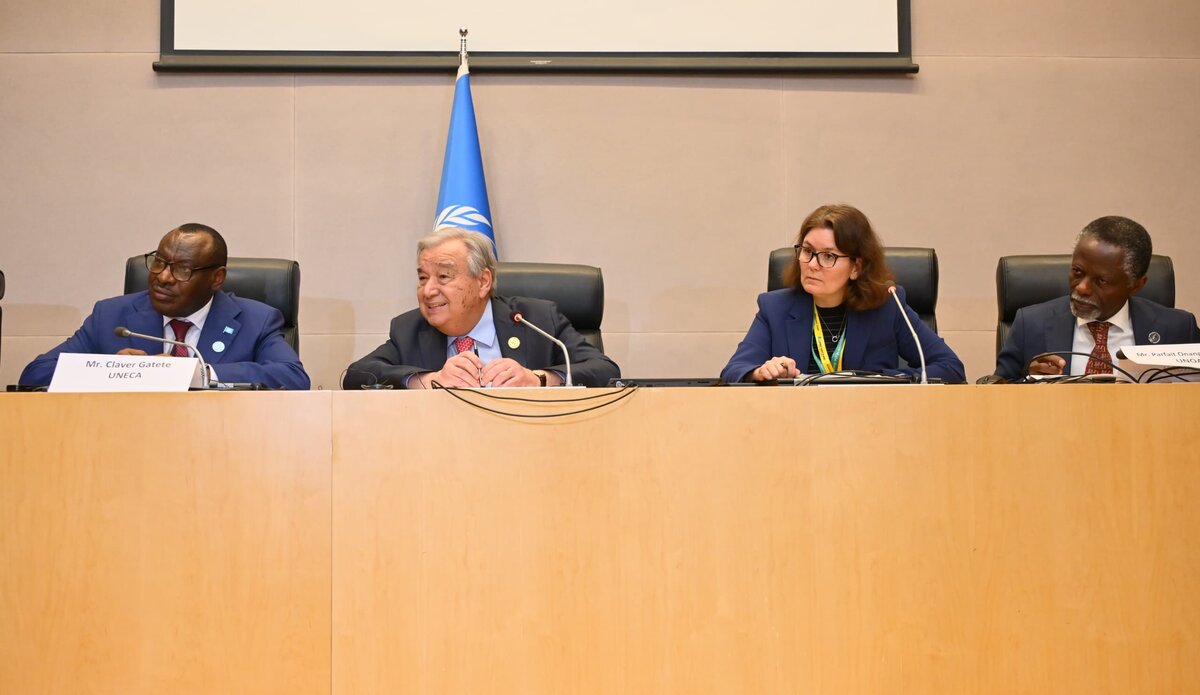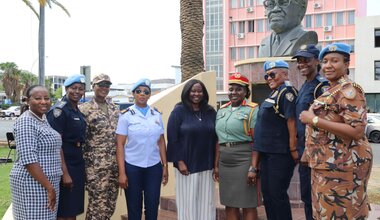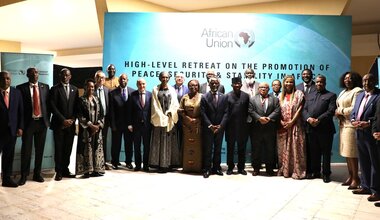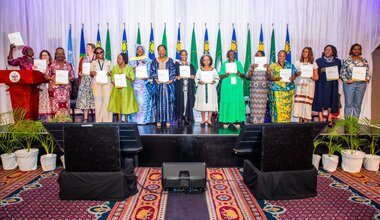UN Secretary-General's press conference in Addis Ababa, Ethiopia | 15 February 2025
15 February 2025
Secretary-General's press conference in Addis Ababa, Ethiopia
Good afternoon.
Over these past three days in Addis Ababa, I have met many leaders from across the continent to discuss challenges across the spectrum.
I want to emphasize that despite the many tests facing Africa, we start from a position of strength.
As I said in my remarks to leaders this morning, the partnership between the African Union and the United Nations has never been stronger.
And this is an especially vital time to build – not least with South Africa’s historic chairing of the G20 this year.
Africa is a continent of possibility and hope, but we also cannot sidestep or sugarcoat essential truths.
Africa has unique needs – and, as the theme of this Summit highlights - Africa faces unique obstacles.
Namely, the profound and deeply rooted legacies of colonialism and the trans-Atlantic slave trade.
Century upon century of exploitation.
Decade upon decade of economic, social and institutional underinvestment.
Year upon year of neglect.
The result – sometimes by accident, but often by design – is a playing field that is stacked against Africa.
A United Nations Security Council where Africa still inexplicably lacks permanent representation.
And an international financial architecture where the power and place of Africa is not fairly at the table.
Correcting age-old injustices is essential to addressing immediate challenges.
My discussions here, broadly speaking, focused on four areas.
First, boosting sustainable development, investment and affordable finance, which are so crucial with just five years left to the deadline of the Sustainable Development Goals. It is in the centre of these concerns that we are pushing for our reforms of international financial architecture to give developing countries more voice, more power, more representation and more access to the resources they need.
Second, securing climate action and justice to tackle an existential threat that the African people did virtually nothing to create. The truth is that some of the worst storms, some of the worst droughts, some of the worst negative impacts of the economies and societies are in Africa, but Africa is not contributing to climate change.
Third, making sure that Africa is not left behind in the technology race.
When it comes to opportunity and capacity building in Artificial Intelligence, AI must stand for Africa Included.
And fourth and fundamentally, achieving and sustaining peace throughout the African continent.
Yesterday, I was honoured to take part in a special session of the African Union Peace and Security Council.
We focused on the crises of Sudan and the Democratic Republic of the Congo.
My messages were clear:
Despite nearly two years of fighting in Sudan, every day brings horrific new reports of civilian killings, human rights abuses and sexual violence.
Hate-speech and ethnically-motivated attacks are on the rise.
And the economy is in freefall.
More weapons flow and more war means more suffering and instability for the region and far beyond.
There is no military solution.
In the spirit of Ramadan which is about to begin, it is time for an immediate cessation of hostilities.
The Sudanese people need a clear path out of this nightmare.
And the world needs a stable, peaceful Sudan.
In the DRC, as more cities fall, the risk of a regional war rises.
It’s time to silence the guns.
It’s time for diplomacy and dialogue.
The recent joint Summit in Tanzania offered a way with a renewed call for an immediate ceasefire.
The sovereignty and territorial integrity of the DRC must be respected.
There is too much at stake. The Congolese people – and the people of the region – deserve peace.
Across the continent, we will continue to work for peace – from Sahel to Somalia and beyond.
And we will keep strengthening our many joint efforts with the African Union for security, stability, human rights and the rule of law.
The challenges are great.
But the opportunities are greater.
The United Nations will be with the people of Africa every step of the way.
And I thank you.
***
Question: Thank you. My question is on the recent international conference on financing for development. Now you have raised to us that the international financial architecture has to be reformed. There are proposals by your agency, the UN. Can you brief us on the progress about that proposal?
Secretary-General: The international financial institutions, the World Bank, the IMF, and others were created after the Second World War. The African continent was practically not represented, because most of today's African countries were still in colonial regimes. And the system that was created was the system adapted to 1945 and the system that would essentially serve the interests of those that created it.
Now the world has changed dramatically, and now the overwhelming majority of the countries of the world are developing countries. And we need to reform the system, the international financial architecture, in order to give much more voice, representation and power to the developing countries, translating it into a number of new, more effective mechanisms to support development in continents like Africa.
We need more concessional funding, which means multilateral development banks need to be reformed in order to be bigger, to be bolder, to be more capitalized, but at the same time more able to attract private investment towards the developing countries. We need to look seriously into the debt question. Many African countries are drowning in debt, and there is no effective mechanism of debt relief. It's important to create that mechanism of debt relief, effective debt relief. And so, there is a number of very important reforms that have been put on the table, whose orientation was approved in the Summit of the Future, but now we must make sure that the meeting in Sevilla will be a meeting of implementation.
Question: Hello Secretary-General, I wanted you to react to what the spokesperson for the European Union said this morning on the crisis in the DRC. He said that the EU urgently should consider all the means as its disposal for a ceasefire in DRC. What do you think those means should be? Should it be a military intervention? Should it be sanctions?
Secretary-General: I do not know what means the European Union is thinking about. I know the means that the African Union is thinking about, and let's be clear, this will be solved if there is an effective Africa unit and African diplomacy to solve the problem. The contribution of other continents like Europe of course will be important but the key to the solution of the problem is here. That is why it was so important to have the joint SADC - East African Community Summit.
In that summit, a clear pathway for a ceasefire was defined, and we believe that an immediate ceasefire is absolutely crucial. But on the other hand, it's absolutely crucial to stop the fighting in order not to extend the area of fighting, because the risks of regional expansion are very high at the present moment, since the offensive into Bukavu.
At the same time, there are a number of important things that were agreed and now need to be put in place. One is the neutralization of the FDLR, the other is the retreat of the Rwandan forces, and at the same time, to have diplomacy and dialogue guaranteeing that the territorial integrity of the Democratic Republic of Congo is maintained, and that we will move into a situation in which there is unity in the way the country is governed.
That is a complex way to go, but I've seen African leaders determined to do that. And whatever help can come from other continents, of course, will be welcome. But the key to the solution of this problem is here. I always thought that African solutions are always the best way to tackle African problems.
Question: My name is [inaudible], I am from Al Jazeera. So my question is, how long would the United Nations remain unable to put an end to the tragedy of the Palestinian people in Gaza. And how can it help for the entry of humanitarian aid, and how do you interpret Trump’s decision to impose sanctions on South Africa. Will it undermine trade in Africa?
Secretary-General: The UN has not the power to stop the fighting in Gaza and to guarantee, the UN by itself, at the present moment, that we move with determination for the only possible solution, which is a two-State solution where there is a Palestinian State side-by-side with an Israeli State.
We know that we do not have a Security Council that probably is prepared for that. But the UN is doing everything possible to support the diplomatic efforts that were taken in order to guarantee the ceasefire and the release of hostages, and now it's absolutely vital that the negotiations for phase two and phase three are successful. It would be inconceivable that the war would start in Gaza again. The suffering of the Palestinian people would be absolutely intolerable.
So our objective now, supporting Qatar, supporting Egypt, supporting the efforts that the United States also have recently, is to make sure that the war does not start again and that phases two and three of the negotiations are successful. And then, I hope progressively, to create the conditions for a solution, and the only solution that is acceptable in my opinion is a two-State solution.
It would be inconceivable to have millions of Palestinians being expelled from the land where they live, as it would be impossible to accept that those Palestinians would leave without any rights in the country, in the land that they always have lived in.
The humanitarian aid has had a dramatic increase since the ceasefire. I would remind you that in the past, it was said that, from the Israeli side, that all conditions were there. It was the UN that was not efficient.
And the UN would say that the problem are the obstacles that are created. As soon as the obstacles were removed with the ceasefire, humanitarian aid has boomed. But being as it is, growing enormously, it is always not enough for the needs of 2.3 million Palestinians in Gaza that now live in the middle of ruins, as you know.
So, we need to do more and more and more, because nothing is enough for a people that is in such dramatic circumstances. But I can promise that we are doing everything we can to make sure that the Palestinian people have access to the minimum necessary to avoid the most traumatic situations that the community is facing.
On South Africa, I have to say that we have enormous hope in relation to the South African presidency at the G20, and we consider that this is an important opportunity to bring the interests of developing countries to the forefront. And in that regard, we will not be so favourable to anything that could be an obstacle to the success of that presidency.
Question: Thank you. Daoud Assan, Al Arabi tv. How much time do we need to see the world of international order collapse after we see something like the United States sanctions against the ICC, after we see the United States plans to evacuate the people of Gaza.
And the second question is there is a lot of conflict in Africa. Is there any mechanism or capability to the African Union to resolve or to deal with this great struggles like in Sudan or in Congo?
Secretary-General: It is clear that the world order based on the rule of law is under treat. It is essential to preserve the values of the Charter, International Law, International Humanitarian Law and International Criminal justice. All these elements are necessary. Many of them are under attack. They have been attacked several times in the past and they have survived, and they will survive. And I believe in a world in which the law is the reference that is preserved.
And in relation to the African Union, something very important has been obtained in the Security Council. Many of these situations cannot be solved with peacekeeping forces. We see that today in the DRC, a peacekeeping force is not able to solve the problem, because there is no peace to keep. And that is the reason why, we managed after five years of constant struggle, to have the Security Council approve the creation of an African Union peace enforcing operations, but peace enforcing operations funded 75 per cent by assessed contributions of the United Nations. And this is the instrument we believe will be more important for the African Union, and we hope, we sincerely hope, that this instrument will be fully applied in Somalia with the renewal, as you know, of the African Union mission in Somalia.
Question: Al Sharq news channel. Can you confirm that you called, during the closed session last night [of the AU Peace and Security Council], for an international investigation in Sudan. And do you have any contacts recently with the two parties in Sudan?
Secretary-General: Yesterday I didn't call for an international investigation, but I've been calling on other occasions. But yesterday, as a matter of fact, I didn't use that call. Indeed, my Special Envoy Lamamra has been in contact with the two sides. I myself have had some sporadic contacts, but it is Lamamra that is doing the job. And we believe that it is absolutely essential that the holy month of Ramadan is used in Sudan to stop the fighting and to create the conditions for diplomacy finally to be possible.
Question: My question to you is that has the United Nations really fulfilled its mandate in terms of fostering peace in the world and, obviously, looking at Africa because even president Trump withheld his contributions, citing that, you know, some of the NGOs and the work that has been done is not supporting what the United Nations is supposed to do. We recently found out that USAID was sponsoring terrorism. So has the United Nations done its part fully? Even with the vaccine agenda, it actually turned out to be a debacle, MRNA vaccines killing people. Why didn’t the United Nations actually advocate that it shouldn’t be such during the COVID-19?
Secretary-General: Well, there are many questions at the same time, let's go to the central one. Obviously, we have a problem in the United Nations, and that problem is related to the geopolitical divides, and the geopolitical divides make the Security Council most times ineffective when we have serious crises.
And so, it's very difficult for the UN, with a paralyzed Security Council, to play an effective role in relation to the solution of many of the conflicts that we have in the world. And that is why the reform of the Security Council is so important, and that is why I insisted once again today, for that reform.
In relation to mandatory vaccination. I never advocated for mandatory vaccination, I advocate for a strong campaign in order to convince people that the vaccination is important. That is the policy that we have adopted very clearly during the COVID time and I think that that policy was effective, even if we had to fight against a lot of misinformation and disinformation with complete lies about vaccines and the risks of vaccines. But I believe that in the end, vaccination was crucial to contain COVID-19 and as I said, I'm not advocating for mandatory vaccination, but I'm advocating for a very active action of governments and civil society in order for vaccination to be accessible to everybody.
Question: Thank you. My name is [inaudible] from Reuters. I have one question on DRC. You have expressed your concerns before on the warring parties to resolve the problems in the DRC. Just today, we have seen a statement by the head of the national army of Uganda, General Muhoozi, telling the national army of DRC to surrender. He has posted on his official X account, telling the national army of DRC to surrender. So, seeing such rhetoric from people with power and position, are you concerned that the conflict in DRC will escalate to a regional war?
Secretary-General: We are not asking anybody to surrender – what we are asking for is a ceasefire and a political and diplomatic effort in order to make sure that the war ends, and in order to make sure that the normal situation is restored.
Source: https://www.un.org/sg/en/content/sg/press-encounter/2025-02-15/secretary...
 UN
UN






